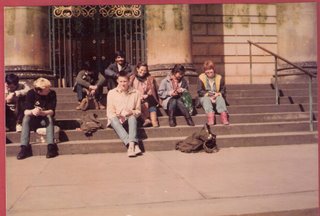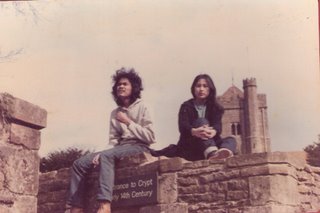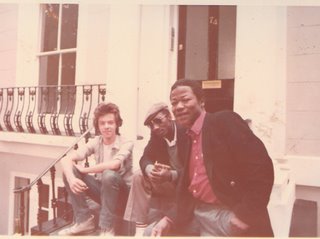days during your tenure at MHS.Even though I was under your wings for a year.but your name appears the most appealing and the most talk about till now.How stern you were and how focus you were during your tenureship at MHS to turn us into a multi talanted students with sheer hard work,deternimation and sound discipline makes us first if not among equal in the fields of sports particularly hockey,rugby,and cricket either at state level competition and a few of us under your wings was able to carry the Nation flags with pride.Naming Razak Leman,Lim Kam Seng,Arikrisnan,Kamaruddin Temu,Dr.Mahindar Singh etc.In the track and field the Lim Chong Watt the ASEAN GAMES gold medalist was under your wings too.
You manage to put MHS in the map again after it glory days of the of the pre independence era.Our alma mater names like Tan Sri Rahman Arshad,Tan Sri Hassan Wahab,Tan Sri Talib Osman our former AG not forgeting our former Finance Minister late Tun Tan Siew Sin,late Dato Mokhtar Daud ,the dad of our Khazanah CEO Dato Azman Mokhtar,Dato Ong See Peck not forgetting hundred thousand others whom are the by product of Melod Hir Squimor.Remembering those nostalgic days and proud to be at one of the earliest education institution in Malaysia after Penang Free.
Well sir under your wings 3 teachers was able to carve their names as Tokoh Guru Kebangsaan.All three were my teachers and they were under your wings to.
1.Cikgu Tahir -recipient of 2001(my hostel master) sure do remember the canning at Cadet Room!!!
2.Miss Alice Wee.(recipient of Tokoh guru 2003) my Class and English teacher when I was in Form I. and
3.Cikgu M.P Rangga Nathan (recipient for 2002)-my BM and English teacher both Malay and Eng.Lit'ure.
Man .....all those three deserve it well and I hands my respect to all three for true academist at heart.Not a single day pass with boredom with all the three teaching.They were our guiding light.And I assume the person they have to thank for up lifting their teaching proffession is you,sir.
My salutation to you for making our present at MHS a pleasent one.
Looking back why do I blog this.Simply becaused I feel that our education system at present is in a state of limbo.The main question asked now is Parent taking over the teachers role?In answering the question I thought it is wise for me to copy and paste a old case which involved you during your tenure at KG5,Seremban,where by your case was up held both at Federal Court and Privy Council in 1970.
The legal mind at the superior court agrees with you sir, all along in question of 'DISCIPLINE.'
Lastly,hopefully you are in the very best of your peek and God bless you soul where ever you are sir.
ANANDARAJAN & ORS V. MAHADEVAN
FEDERAL COURT [KUALA LUMPUR]
FC SUFFIAN A-G LP, J, GILL, FJ, ALI, FJ
[CIVIL APPEAL NO. X 95 OF 1969]
12 FEBRUARY 1971
JUDGMENT
Suffian A-G LP:
There are two judgments in this case, one by my brother Gill and the other by my brother Ali. shall ask my brother Gill to read his first and then I shall ask my brother Ali to read his next.
JUDGMENT
Gill FJ:
This is an appeal from a judgment of the High Court at Seremban whereby it was declared that the expulsion of the respondent, plaintiff in the action, as a pupil from King George v. School, Seremban by the first appellant, first defendant to the action, as headmaster of the said school was null and void, and an order made for his reinstatement. The second and third appellants were joined in the action as second and third defendants.
The plaintiffs case as contained in his statement of claim was that at no time was he or his father made aware of any charges or accusations or allegations of misconduct against him, that neither he nor his father was given an opportunity to answer any charges or accusations against him, that no reasons were given for his expulsion from the school and that in expelling him from the school the first defendant had acted maliciously, capriciously, wrongfully and without any lawful reasons. The defence was a denial of each and every allegation of fact contained in the statement of claim. The defendant further averred that the plaintiff and his guardian were given ample opportunities to present their appeal to the Board of Governors.
At the trial of the action there was conflicting evidence as regards the circumstances leading up to the plaintiffs expulsion. The plaintiff's evidence was that on 6 May 1968, following an announcement by the first defendant in the school hall that a pupil was to be expelled, he was called to the first defendant's office where he was informed that he was being expelled and told to go home. A leaving certificate was subsequently sent to his father. He was not asked to explain anything before he was expelled, and no reason was given to him or to his father for his expulsion. His father appealed against the first defendant's decision to the Board of Governors of the school, but the appeal was rejected and the decision of the first defendant confirmed. Under crossexamination he told a story about the headmaster calling him one day to his office and harassing him, about which he made a report to the police on 10 April 1968.
The first defendant's evidence was that the plaintiff was expelled from school because of the reports regarding the plaintiff's misbehaviour at a talentime show held in the school on 1 April 1968. These reports were made to him by the teacher in charge of the show, the head prefect and the chairman of the Interact Club. On 2 April 1968 he called the plaintiff and some other boys to his office for the purpose of enquiring into the reports. At first he questioned them together in a group but later interviewed them separately one by one. At his interview with the plaintiff, he asked the plaintiff about his alleged misbehaviour at the talentime show and on previous occasions. The plaintiff denied some of the allegations but admitted some of them. At the end of the interview he was satisfied that it was necessary and desirable to expel the plaintiff for the purpose of maintaining discipline in the school, but he decided to consult his colleagues in order to counter-check his convictions before making the order of expulsion. Having consulted his colleagues, he fully made up his mind on 10 April 1968 to expel the plaintiff, but as the school was about to close for the first term holidays and as he had to go to Johore Bahru on official business, he had no time to convey the decision to the plaintiff until the school re-opened on 6 May 1968.
The findings of fact of the learned trial judge, with which I entirely agree, are set out in his judgment as follows:-
It is clear from the evidence of DW1 that he decided to expel the plaintiff after the talentime show on 2 April 1968, being satisfied that it was necessary to expel the plaintiff for the purpose of maintaining discipline in the school.
I am satisfied that on 2 April 1968, DW1 had sufficient evidence relating to instances of the plaintiffs misconduct in his possession to justify him to commence proceedings to expel the plaintiff. I have carefully considered the evidence given by the plaintiff and head teacher and I form the impression that the plaintiff was not telling the truth to this Court when he denied the allegations. On the other hand, I accept the evidence given by DW1. I have not the slightest doubt that the allegations of the plaintiff's misconduct are well-founded. It is apparent from the evidence that the plaintiff is an intelligent pupil but it is most unfortunate that his conduct has not matched his mental qualities. The reports received by DW1 irresistibly show that the plaintiff was not only irresponsible, arrogant, spoilt and conceited, but also inconsiderate and had no respect for authority."
The power of a head teacher of any school to expel a pupil is contained in reg. 8 of the Education (School Discipline) Regulations, 1959 (LN 61/1959), which reads as follows:-
Whenever it appears to the satisfaction of the head teacher of any school -
(a) to be necessary or desirable for the purpose of maintaining discipline or order in any school that any pupil should be suspended or expelled .... he may by order expel him from such school."
With respect, the effect of reg. 8 is correctly set out by the learned trial Judge in his judgment when he says:
Regulation 8 seems to me to require that the head teacher must first be satisfied that the plaintiff's expulsion is necessary or desirable for the purpose of maintaining discipline or order in the school before he issued the order. It also implies that the head teacher is required to make a decision before issuing the order. Before taking such a decision there must be some process whereby the head teacher can satisfy himself of the pupil's misconduct justifying the expulsion."
The learned trial Judge next considered the question as to whether an order made by a head teacher under reg. 8 may be judicially reviewed. In considering that question he cited the following passage from de Smith on Judicial Review of Administrative Action, 1st Ed, at pages 61-62:
In considering the scope of judicial review, a further broad distinction must be drawn between ministerial, legislative, and executive or administrative powers, on the one hand and judicial powers, on the other. The validity of the exercise of ministerial, administrative and legislative powers affecting the legal interests of individuals is always open to challenge in the Courts, unless judicial review has been excluded, directly or indirectly, by the relevant legislation. If the exercise of the power is predicated on findings of law or fact, the correctness of those findings may be impugned directly or in any appropriate form of collateral proceedings - e.g., by resisting an action or prosecution for enforcement of the order, by bringing an action for a declaration that the order is null and void, or by suing the actor for a civil wrong."
He then referred to a dictum of RL Narasimham CJ in Sahu v. N Padhy, Principal, Khallikete College, Berhampur AIR 1959 Orissa 196 to the effect that it is indeed very difficult to decide whether a particular order is quasijudicial or administrative, and then reached the conclusion that although the word "decide" is not used in reg. 8 the effect of the language used seems to support the view that the order of the head teacher is a quasi-judicial order. He then went on to say:
The clement of 'decision' which I think is a necessary ingredient when exercising a judicial function may be implied from the language used. Furthermore, the fact that the Regulations also make provision for an appeal against the 'decision' of the head teacher (reg 10) tends to strengthen my view that it is a quasi-judicial order.
Again, with respect, I entirely agree.
It being agreed that the functions of the first defendant under reg. 8 were quasi-judicial and not merely administrative, it follows that in the making of an order under the regulation he had to observe the rules of natural justice. As to the requirements of natural justice, their Lordships of the Privy Council in University of Ceylon v. Fernando [1960] All ER 631, 637 expressed approval of the following general statement of the law by Harman J in Byrne v. Kinematograph Renters Society, Ltd: [1958] 2 All ER 579, 599
What, then, are the requirements of natural justice in a case of this kind? First, I think that the person accused should know the nature of the accusation made; secondly, that he should be given an opportunity to state his case; and, thirdly, of course, that the tribunal should act in good faith. I do not think that there really is anything more.
In Ridge v. Baldwin [1964] AC 40, 64, 65, 80 Lord Hodson said:
No one, I think, disputes that three features of natural justice stand out - (1) the right to be heard by an unbiased tribunal; (2) the right to have notice of charges of misconduct; (3) the right to be heard in answer to those charges.
Taking first the requirement of natural justice that a quasi-judicial tribunal should be unbiased and should act in good faith, it is abundantly clear that the first defendant was not actuated by any unlawful motive in making the order of expulsion against the plaintiff. In this connection I need do no more than to repeat the conclusions of the learned trial judge. This is what he said:-
It is needless for me to repeat that it is abundantly clear from the evidence that DW1 had good reasons for wanting to expel the plaintiff. In these circumstances, I find that the plaintiff's allegations that the 1st defendant had acted unlawfully, maliciously, capriciously and without valid reasons are without substance and ill-founded. To my mind, there is no shadow of a doubt as to the honesty and bona fide of the head teacher.
I need hardly add that the first and fundamental element of natural justice was therefore complied with.
As regards the requirement of natural justice that the person accused should know the nature of the accusations made, the learned Judge took the view that the question before the Court was whether the plaintiff before the expulsion order was made, acquired adequate notice of his impending expulsion and, if he did, whether an adequate opportunity to explain was accorded to him. With respect, the rules of natural justice did not require that the plaintiff should have been given adequate notice of his impending expulsion. What the rules of natural justice required was that the nature of the occupations, as opposed to the punishment which could be inflicted upon him if those accusations were proved to be true, was made known to him. And there is ample evidence to show that he was told of specific instances of misbehaviour at the talentime show on 1 April 1968 and other instances of misbehaviour on previous occasions. I do not see therefore how it can be argued that this requirement of natural justice was not complied with.
That brings me to the only other, perhaps the most important, of the requirements of natural justice, namely, that the person accused should be given an opportunity to state his case. That this requirement of natural justice postulates the holding of some sort of inquiry is beyond question, but there is no universal formula as regards the procedure to be adopted in conducting the inquiry.
The right of a person to an inquiry has been defined in varying language in a large number of cases covering a wide field. It was laid down in Board of Education v. Rice [1911] AC 179 that a tribunal holding a quasi- judicial hearing is not bound to treat the inquiry as if it were a judicial trial. That was a case in which the Board of Education was required to dispose of a question which was the subject of an appeal to it. Lord Loreburn LC said (p. 182):
In such cases the Board of Education will have to ascertain the law and also to ascertain the facts. I need not add that in doing either they must act in good faith and fairly listen to both sides, for that is a duty lying upon everyone who
decides anything. But I do not think they are bound to treat such a question as though it were a trial. They have no power to administer an oath, and need not examine witnesses. They can obtain information in any way they think best, always giving a fair opportunity to those who are parties in the controversy for correcting or contradicting any relevant statement prejudicial to their view.
The above case was cited with approval in Local Government Board v. Arlidge [1915] AC 120 in which Lord Shaw of Dunfermline said (p. 138):
The words 'natural justice' occur in arguments and sometimes in judicial pronouncements in such cases. My Lords, when a central administrative board deals with an appeal from a local authority it must do its best to act justly, and to reach just ends by just means. If a statute prescribes the means it must employ them. If it is left without express guidance it must still act honestly and by honest means. In regard to these certain ways and methods of judicial procedure may very likely be imitated; and lawyer-like methods may find especial favour from lawyers. But that the judiciary should presume to impose its own methods on administrative or executive officers is a usurpation. And the assumption that the methods of natural justice are ex necessitate those of Courts of justice is wholly unfounded. This is expressly applicable to steps of procedure or forms of pleading.
Lord Parmoor in delivering the judgment of the Privy Council in De Verteuil v. Knaggs [1918] AC 557, 560 said:
... Their Lordships are of opinion that in making such an inquiry there is, apart from special circumstances, a duty of giving to any person against whom the complaint is made a fair opportunity to make any relevant statement which he may desire to bring forward and a fair opportunity to correct or controvert any relevant statement brought forward to his prejudice. It must, however, be borne in mind that there may be special circumstances which would justify a Governor, acting in good faith, to take action even if he did not give an opportunity to the person affected to make any relevant statement, or to correct or controvert any relevant statement brought forward to his prejudice. For instance, a decision may have to be given on an emergency, when promptitude is of great importance; or there might be obstructive conduct on the part of the person affected.
Lord Atkin in the case of General Medical Council v. Spackman [1943] 2 All ER 337, 341 expressed his view on the subject in these words:-
Some analogy exists no doubt between the various procedures of this and other not strictly judicial bodies; but I cannot think that the procedure which may be very just in deciding whether to close a school or an insanitary house in necessarily right in deciding a charge of infamous conduct against a professional man.
Tucker LJ in Russell v. Duke of Norfolk [1949] 1 All ER 109, 118 said something to the same effect in the following words:-
There are, in my view, no words which are of universal application to every kind of inquiry and every kind of domestic tribunal. The requirements of natural justice must depend on the circumstances of the case, the nature of the inquiry, the rules under which the tribunal is acting, the subject-matter that is being dealt with, and so forth.
All the above cases were cited with approval by the Privy Council in University of Ceylon v. Fernando [1960] 1 All ER 631, 637 in which Lord Jenkins delivering the judgment of the Board summed up their effect as follows (p. 637):
... the question whether the requirements of natural justice have been met by the procedure adopted in any given case must depend to a great extent on the facts and circumstances of the case in point.
Lord Reid in Ridge v. Baldwin AC 40, 64, 65 80 said (p. 65):
... It appears to me that one reason why the authorities on natural justice have been found difficult to reconcile is that insufficient attention has been paid to the great difference between various kinds of cases in which it has been sought to apply the principle.
To my mind, the result of all these judgments is that a quasi-judicial body is free to adopt its own rules of procedure, provided they are fair having regard to the circumstances of the case. This is particularly so when there is no procedure laid down in the relevant provision of law under which the quasijudicial body is authorised to act.
It is clear from the evidence, as I have already said, that specific allegations of misbehaviour at the talentime show and on previous occasions were made against the plaintiff when he was called by the first defendant to the office on 2 April 1968. The first defendant stated on oath that he called the plaintiff and two other boys to his office on that day to investigate the validity of the reports which had been made to him regarding the plaintiffs misbehaviour and to decide on what course of action to take. It. cannot be denied, therefore, that the first defendant was in fact holding an inquiry into the allegations made against the plaintiff. The allegations or charges or accusations having been made known to the plaintiff, the question which arises is whether he was given an opportunity to state his case.
The right of a person to be heard before any order is made to his detriment is embodied in the maxim audi alteram partem. Speaking of what Lord Reid said in the House of Lords in Ridge v. Baldwin [1964] AC 40, 64, 65, 80 regarding the different categories of cases in which that maxim should apply, Lord Upjohn delivering the judgment of the Privy Council in Durayappah v. Fernando [1967] 2 AC 337, 349 said:
In that case no attempt was made to give an exhaustive classification of the cases where the principle audi alteram partem should be applied. In their Lordships opinion it would be wrong to do so. Outside well-known cases such as dismissal from office, deprivation of property and expulsion from clubs, there is a vast area where the principle can only be applied upon most general considerations. ... Outside the well-known classes of cases, no general rule can be laid down as to the application of the general principle in addition to the language of the provision. In their Lordships' opinion there are three matters which must always be borne in mind when considering whether the principle should be applied or not. These three matters are: first, what is the nature of the property, the office held, status enjoyed or services to be performed by the complainant of injustice. Secondly, in what circumstances or upon what occasions is the person claiming to be entitled to exercise the measure of control entitled to intervene. Thirdly, when a right to intervene is proved, what sanctions in fact is the latter entitled to impose upon the other. It is only upon a consideration of all these matters that the question of the application of the principle can properly be determined.
In R v. Senate of the University of Aston [1969] 2 All ER 964 the divisional Court was faced with applications for certiorari and mandamus by two students who had been sent down for failure in examinations and who complained that they had been given no opportunity to make representations before their fate was decided. In fact the various authorities of the university had considered and reconsidered the matter anxiously in a series of meetings, in the course of which they, fully heard the students' explanations. But in law the effective act was the initial decision of the examiners that the students be required to withdraw. This decision was taken without reference to them, and various personal and non-academic circumstances were taken into account. The divisional Court found that this amounted to a denial of natural justice. But they refused the relief sought, since the students had let over seven months pass before taking legal action, and the prerogative remedies "should not be available to those who sleep upon their rights". Donaldson J in the course of his judgment in the case said:
... Whatever may be the position elsewhere, students at Aston are members of the university and he was being deprived of his membership.
In my judgment it is not right to treat the principle of audi alteram partem as something divorced from the concept of natural justice, although it will certainly not apply in every case in which there is a right to natural justice. Where, however, it does apply, it is an integral part of natural justice and may indeed lie at its heart.
As stated in the note on the above case in the 1969 Law Quarterly Review (vol 85) at page 469, the decision that students are in principle entitled to natural justice is yet another example of the Courts' insistence that all kinds of persons in authority should respect the fundamentals of fair procedure, and it would seem clear from the authorities that where the person concerned is faced with some sort of charge the maxim audi alteram partem must apply.
As I have said, what the first defendant was required to do in the observance of the rules of natural justice was to state the charges against the plaintiff, which he clearly did. There is ample evidence to show that the plaintiff did in fact answer all the charges, which meant that he availed himself of the opportunity given to him to state his case. He admitted some of the charges and denied the others. For example, he admitted occupying a $3-seat after paying for a $2-seat and laughing and leaving the hall a few times during the show to cause interruption. The first defendant informed the plaintiff of his misbehaviour with the Prefects' Board, which the plaintiff admitted. He brought to the plaintiff's notice his attitude towards the prefects. To this charge the plaintiff had nothing to say, and he just kept quiet. He was told that when it suited him he brought a medical certificate in order to be absent from afternoon games, and yet he was found playing games other than those that he was supposed to play. He admitted running away from school activities, but added by way of explanation that it did not hurt him if he played badminton. Indeed, the only allegations which the plaintiff denied were that he shouted filthy words and flicked matches.
The first defendant stated in evidence that be expelled the plaintiff because of the cumulative effect of his behaviour including reports about his being found on two separate occasions with a girl in a closed class-room in defiance of what he was told not to do. And he went on to say that every time something had been brought up against the plaintiff in the past, he was given a chance to answer. Admittedly, he consulted with his colleagues and obtained their reports as regards the general behaviour and conduct of the plaintiff prior to his becoming the headmaster of the school on 1 January 1968, but there is not the slightest indication from the evidence that he did this in order to strengthen the case for the plaintiffs expulsion. On the other hand, his evidence was that he decided to consult his colleagues in order to countercheck his convictions. This would seem to suggest that had the reports which he received from his colleagues been favourable the plaintiff might never have been expelled. The first defendant had received all these reports by 10 April 1968 and his evidence is that mentally he expelled the plaintiff on the same day, so that the giving of his decision on 6 May 1968 amounted to nothing more than the promulgation of a decision already made.
It was contended on behalf of the plaintiff in the Court below, and this in fact is the main contention in support of the judgment appealed from, that he should have been called upon to show cause why he should not be expelled. In other words, the contention is that the first defendant, having held one inquiry on 2 April 1968 to satisfy himself of the truth or falsity of the allegations against the plaintiff on the basis of which he might make an order for the plaintiff's expulsion, should have gone on to hold another inquiry merely to enable the plaintiff to show cause why he should not be expelled. I do not agree with that contention. On the basis of the plaintiff's admission of a number of allegations against him, to which I have referred earlier in my judgment, it was open to the first defendant to hold himself satisfied that it was necessary or desirable for the purpose of maintaining discipline or order in the school to expel the plaintiff. The fact that the first defendant consulted with his colleagues before making the order did not, in my view, in itself involve any violation of the requirements of natural justice. I say this in view of the first defendant's evidence that he decided on 10 April or even earlier on 2 April that the plaintiff should be expelled, but that he executed that decision after he came back from Johore Bahru.
To sum up, as reg. 8, which invested the first defendant with a quasi-judicial function here in question, prescribes no special form of procedure, it was for him to determine the procedure to be followed as he thought best, subject to the obvious implication that some form of inquiry was to be held, such as would enable him fairly to determine whether he should hold himself satisfied that the allegations against the plaintiff had been made out, and that he had to do his best to act justly and to reach just ends by just means. It is clear that the first defendant did hold some sort of inquiry on 2 April 1968 and that at this inquiry he gave the plaintiff every opportunity to defend himself. The plaintiff admitted some of the accusations, on the basis of which it was open to the first defendant to make the order of expulsion. For the maintenance of discipline and order in any school a head teacher cannot be expected to hold an elaborate inquiry before making an order. In my judgment, a school comes under the category of that vast area where the principle of audi alteram partem can only be applied upon most general considerations, as stated by the Privy Council in Durayappah v. Fernando. [1967] 2 AC 337, 349 I would conclude by saying that in my opinion the first defendant acted justly and reached just ends by just means in making the order of expulsion against the plaintiff.
I would allow the appeal and set aside the order made in the Court below. The appellants are to have their costs of this appeal and in the High Court.
JUDGMENT
Ali FJ:
The respondent, a minor, was expelled from his school, The King George v. School, Seremban, by the head teacher, the first appellant, exercising power conferred by reg. 8 of Education (School Discipline) Regulations 1959. The regulation provides:
8 .Whenever it appears to the satisfaction of the head teacher of any school -
(a) ) to be necessary or desirable for the purpose of maintaining discipline or order in any school that any pupil should be suspended or expelled; or
(b)that any pupil has contravened the provisions of reg. 7,
he may by order suspend such pupil from attendance at such school for such period as he may think fit, or expel him from such school.
The respondent or his father promptly but unsuccessfully appealed to the Board of Governors under reg. 10. He could have taken the matter further to the Minister but he did not do so. Instead he sued the head teacher, the Board of Governors as well as the Minister of Education for a declaration that the expulsion was null and void and of no effect. As consequential reliefs, he prayed for an order of reinstatement and also claimed damages. He succeeded in obtaining the declaration as well as an order reinstating him as a pupil of the school, but his claim for damages failed. From the written judgment the learned trial Judge seems satisfied that the respondent was not given an opportunity to be heard in his defence before he was expelled. Thereupon he concluded that there has been a breach of the principle of natural justice. If the matter had come to the Court by way of a motion for an order of certiorari the declaration made would have the effect of an order quashing the decision of the head teacher and was sufficient to enable the respondent to be re-admitted as a pupil of the school. So far as the order of reinstatement is now a ground of appeal, I shall dispose of it in a few words. I agree with the appellants that the trial Court ought not to have made the order. But on record it would appear that at the time when this appeal came for hearing before us, the respondent had virtually left the school and was only waiting to enter a university. He was able to return to the school, despite his expulsion, because of a consent order made by Yong J in July 1968. In the event the point taken by the appellants can only be of academic interest. The order of reinstatement, even if set aside, will not adversely affect the respondent.
The substantial dispute, here and below, is whether the respondent was given an opportunity to be heard in his defence before he was expelled. That seems clear from the pleadings and from the evidence at the trial. In coming to the conclusion that the respondent was not given a fair opportunity, the learned trial Judge had, presumably, considered the evidence of the respondent himself and that of the head teacher, the first appellant. The facts established, so far as these were not in dispute, are as follows:
On 6 May 1968, the head teacher informed the respondent that he was expelled from the school. He was not told of the reasons for his expulsion. His father and his solicitors wrote asking for the reasons in order to formulate their grounds of appeal to the Board of Governors. They were unsuccessful. After hearing the appeal the board informed the respondent's father by a letter on 1 June 1968 confirming the head teacher's decision. Thirteen days later he commenced the action in this appeal.
Broadly stated, the respondent's case rested on two main grounds, namely:-
(a) the head teacher had acted maliciously, capriciously, wrongfully and without any lawful reason. (See para 9 of the statement of claim - page 10 of the record).
(b) both the head teacher and the Board of Governors acted unlawfully and against the rules of natural justice. (See para 11 of the statement of claim - page 10 of the record).
The learned trial Judge rejected (a) saying:
It is needless for me to repeat that it is abundantly clear from the evidence that DW1 had good reasons for wanting to expel the plaintiff. In these circumstances, I find that the plaintiff's allegations that the 1st defendant had acted unlawfully, maliciously, capriciously and without valid reasons are without substance and ill-founded. To my mind, there is no shadow of a doubt as to the honesty and bona fide of the head teacher.
Inasmuch as there is no cross appeal by the respondent against this finding, I need say no more about it. But as regards (b), the learned trial Judge as stated earlier, found that the respondent was not given a fair opportunity to be heard. It was a finding based on the evidence and on the view taken of the law relating to natural justice. In the light of the arguments addressed to the Court, I consider it of the utmost importance that there should be a clear understanding of the written judgment. Without this it will be extremely difficult to say whether or not the learned trial Judge has applied the legal principles correctly. I have endeavoured to the best of my ability to adopt this line of approach and in so doing have come to the view that the judgment of the trial Court should be upheld as reasonable so far as it was founded on evidence and that the learned trial Judge has applied the legal principles correctly.
On the issue whether or not the respondent was given a fair opportunity to be heard, the dispute turned solely on the interview at the head teacher's office on 2 April 1968. The respondent's evidence of the interview was:
The headmaster accused me of misbehaving at the talentime show. He first accused me, then started scolding. There was no other charge or accusation levelled against me on that day. The headmaster never advised me. He only said that 'at the rate you are going on, one of these days you'll find this knife stabbed at your back.' I was scared.
Shortly put, the respondent thus clearly admitted that the report of misconduct at the talentime show was put to him in some details and that he was given a fair opportunity to explain. But as far as he was concerned no other charge of misconduct was put to him on that day. The head teacher swore to the contrary. He said besides the talentime show report he also put to the respondent various other reports of misconduct. The manner in which he put them was described in these words:
I informed the plaintiff of his misbehaviour with the Prefects' Board and plaintiff admitted. I also brought to his notice his attitude towards the prefects and he had nothing to say about it. Plaintiff just kept quiet. I also told him that when it suits him he brought a medical certificate in order to be absent from afternoon games, and yet he was found playing games other than that he was supposed to play. It was not really a medical certificate but a letter from the father saying he was ill. I told him that he was running away from school activities. He admitted but said that the pain does not hurt him if he plays badminton. I also told him that as a pupil his primary task was to develop wholesome habits in the academic and extra-curricular fields, and reports of his academic progress from his teachers were far from satisfactory. He denied it. I meant not up to the mark when I said far from satisfactory. I showed him certain remarks - remarks written by teachers in his own books which I initialled myself. The remarks were that he was far from satisfactory and a bad influence in the class.
Later on he said:-
I took into consideration all these before I came to my decision. Before I came to my decision I both discussed and explored my convictions. By that time a number of reports were made against the plaintiff.
Further in para 7 of his affidavit affirmed on 4 July 1968 he referred to the interview on 2 April stating:-
... I considered taking expulsion action against the plaintiff. With that in view I consulted my senior teachers and the form teacher who were all of the view that in view of the plaintiff's extremely bad conduct and character he should be expelled. After several discussions and receiving all verbal reports from the form teacher I decided to expel the plaintiff. This decision was taken by me on the 10 April 1968.
But to questions in cross-examination he gave a weak reply in these words:-
I did not tell the plaintiff that 'these are the charges, and unless you have a satisfactory explanation I am going to expel you'. I did say to the plaintiff that I will probably expel or take action - something to that effect.
On the evidence such as it was, the learned trial Judge concluded in these words:-
In the light of the principles laid down in the cases cited above, I am satisfied that in the circumstances of the present case a mere warning by DW1 that the plaintiff may probably be expelled fell short of the requirements of natural justice. DW1, in my opinion, omitted to provide adequate notice to the plaintiff to enable him to truly appreciate the exact nature and purpose of the proceedings when
he interviewed the plaintiff at his office on 2 April 1968. In my view, such omission had the necessary effect of depriving the plaintiff of a fair opportunity of being heard.
The appellants are now saying that this conclusion proceeded on an erroneous view of the principle of natural justice. It is not easy to discover the true basis of the complaint from the memorandum of appeal for there it is merely stated that there was sufficient compliance with the principle of natural justice. But upon reading the learned Solicitor-General's written submission, it became clear to me that certain passages from the written judgement were being criticised as expressing an erroneous view of the law. In para 3 on page 8 of the written submission the grounds of appeal were enlarged in these terms:-
The learned Judge should have held that the requirements of natural justice have been fully complied with. None of the cases on natural justice has ever gone so far as to require that the respondent must be told that he would be expelled unless he explained. Further, none of these cases has ever gone so far as to say that natural justice can only be complied with by holding an inquiry as if it is a formal trial.
This statement, I think, was largely prompted by certain passages appearing in the judgment of the learned trial judge. One passage reads:
I am satisfied that on 2 April 1968, DW1 had sufficient evidence relating to instances of the plaintiff's misconduct in his possession to justify him to commence proceedings to expel the plaintiff. I have carefully considered the evidence given by the plaintiff and head teacher and I form the impression that the plaintiff was not telling the truth to this Court when he denied the allegations. On the other hand, I accept the evidence given by DW1 I have not the slightest doubt that the allegations of the plaintiff's misconduct are well-founded. It is apparent from the evidence that the plaintiff is an intelligent pupil but it is most unfortunate that his conduct has not matched his mental qualities. The reports received by DW1 irresistibly show that the plaintiff was not only irresponsible, arrogant, spoilt and conceited, but also inconsiderate and had no respect for authority.
Another reads as follows:-
It is needless for me to repeat that it is abundantly clear from the evidence that DW1 had good reasons for wanting to expel the plaintiff. In these circumstances, I find that the plaintiff's allegations that the first defendant had acted unlawfully, maliciously, capriciously and without valid reasons are without substance and ill-founded. To my mind, there is no shadow of a doubt as to the honesty and bona fide of the head teacher.
The question before the Court is whether the plaintiff, before the expulsion order was issued, acquired adequate notice of his impending expulsion and, if he did, whether an adequate opportunity to explain was accorded him. In short, whether DW1 before arriving at a decision to expel the plaintiff did apply some form of procedure in compliance with the rules of natural justice.
Having said all these, he made the following finding of facts:-
... In any event, it is, I think, abundantly clear that at no time did DW1 give any definite intimation or warning to the plaintiff during the interview on 2 April 1968, that he was going to be expelled unless he could give an explanation. He could not in the circumstances have done so since at that time no definite action was contemplated by DW1 DW1 admitted in the affidavit on page 18 of Ex P1 that he only decided the expulsion after several discussions and receiving verbal reports from the form teacher.
I would summarise the passages thus referred to in this way. Though satisfied that there might be valid grounds for the respondent's expulsion, the learned trial Judge was not satisfied that the respondent was given a fair opportunity to exculpate himself or to prove his innocence. The reason given was that on 2 April 1968 the respondent was not told in definite terms that he was before the head teacher in an enquiry to consider his expulsion from the school. Perhaps it is true that no case on natural justice has ever gone so far as to require the head teacher to inform the respondent the purpose of the enquiry. But, as pointed out by Lord Reid in Ridge v. Baldwin & Ors [1964] 40, 64, 65, 80 cases on natural justice are not easy to reconcile inasmuch as they were concerned with different kinds of situations.
What a minister ought to do in considering objections to a scheme may be very different from what a watch committee ought to do in considering whether or not to dismiss a chief constable. Likewise, it can be said that what a police commissioner ought to do in considering the revocation of a taxi driver's licence as in the case of Regina v. Metropolitan Police Commissioner Ex parte Parker [1953] 1 WLR 1150 may well be different from what a head teacher of a school ought to do in considering the expulsion of a pupil under reg. 8 of Education (School Discipline) Regulations 1959. I mention this merely to illustrate the difficulty which sometimes arises from an attempt to extend the words of a particular judgment in a decided case to the circumstances of another case. Lord Reid in Ridge v. Baldwin, supra, realised such difficulty when he said on page 64:
... The authorities on the applicability of the principles of natural justice are in some confusion, and so I find it necessary to examine this matter in some detail. The principle audi alteram partem goes back many centuries in our law and appears in a multitude of judgments of judges of the highest authority. In modern times opinions have sometimes been expressed to the effect that natural justice is so vague as to be practically meaningless. ... It appears to me that one reason why the authorities on natural justice have been found difficult to reconcile is that insufficient attention has been paid to the great difference between various kinds of cases in which it has been sought to apply the principle.
The present case is no different from those referred to by Lord Reid for the difficulty, if at all there is any, would really lie in the application of the principle audi alteram partem to the facts of this case. Fortunately, however, the dispute here raises no difficulty in understanding the issue between the parties. I have already referred to the issue. So far as the trial Court's decision on the issue was in favour of the respondent the appellants have the unenviable task of challenging it on the ground that it was unreasonable having regard to the evidence. In other words, it must be shown that the finding of fact was against the weight of evidence. In my judgment whatever view is to be taken of the evidence the inescapable conclusion would be that no proper or fair opportunity was given to the respondent to prove his innocence. If the respondent did not know that he was going to be expelled it is reasonable to infer that he could not possibly know the significance of giving any explanation to avoid expulsion. The head teacher's evidence carefully examined disclosed nothing more than a severe reprimand or a warning that the respondent would find himself in trouble if he persisted in behaving the way he was reported to have behaved in the past. The expulsion announced on 6 May 1968 surprised the respondent as, indeed, it must. If he had known earlier, positive steps would have been taken for his father and other members of his family are persons who would use every means at their disposal to fight the expulsion. As it were nothing positive was done until after 6 May For reasons already stated, I would dismiss this appeal.
I have so far avoided making detailed references to the cases cited by the learned trial Judge or by the learned Solicitor-General. The main reason, as indicated earlier, is to avoid saying anything which may cause confusion or difficulty in understanding the consideration of the principle involved. This principle so far as it seems relevant to this appeal is best expressed in the words of Lord Reid in Ridge v. Baldwin supra.
On page 80 it is stated thus:
... The body with the power to decide cannot lawfully proceed to make a decision until it has afforded to the person affected a proper opportunity to state his case.
It is also to be found in the judgment of Viscount Haldane, LC in Local Government Board v. Arlidge [1915] AC 120 on page 132 as follows:
...I agree with the view expressed in an analogous case by my noble and learned friend Lord Loreburn. In Board of Education v. Rice he laid down that, in disposing of a question which was the subject of an appeal to it, the Board of Education was under a duty to act in good faith, and to listen fairly to both sides, inasmuch as that was a duty which lay on every one who decided anything. But he went on to say that he did not think it was bound to treat such question as though it were a trial. The Board had no power to administer an oath, and need not examine witnesses. It could, he thought, obtain information in any way it thought best, always giving a fair opportunity to those who were parties in the controversy to correct or contradict any relevant statement prejudicial to their view.
The passage just quoted was also referred to by Lord Jenkins in his judgment in the University of Ceylon v. Fernando. [1960] 1 All ER 631, 637 See particularly the judgment on page 638. From these passages it would appear to me that any opportunity given to a person affected must be fair or proper opportunity as otherwise it cannot come within the rule of natural justice. It was this more than anything else which led the trial Court to conclude that there has been a violation of the principle audi alteram partem.
In the course of the arguments before us, it was also urged on behalf of the appellants that the principle audi alteram partem need not, in the circumstances of the present case, be applied. I recall this as having been said by the learned Solicitor-General more than once. I also recall as having been said that this was a new point or a novel proposition of law. Such as it was, it is not surprising that authority on the point is difficult to find. However, the arguments proceeded on the basis that unlike a university student, a pupil of a school has no right. It was said that he has no right under the
Education Act. If this was a reason for the view that the principle i audi alteram partem is inapplicable, I cannot, with respect, accept it as sound. The right to be heard in one's defence is a common law right unrelated to any other rights. Since the judgment of Lord Reid in Ridge v. Baldwin, supra, there is, at least, some doubt whether the principle audi alteram partem applies only when a tribunal making a decision is performing a judicial or quasi- judicial function. In the Law Report dated 23 March 1970 Lord Denning was reported to have said in the Court of Appeal in the case of i Regina v. Gaming Board for Great Britain Ex parte Benaim and Khaida [1970] 2 WLR 1009; [1970] 2 All ER 528 this:-
At one time it was said that the principles only applied to judicial and not to administrative proceedings; but that was not accepted in i Ridge v. Baldwin. At another time they were said not to apply to the grant or refusal of licences, but speeches in the Ridge case showed that that, too, was now wrong.
In the same case Lord Denning also referred to Lord Parker in Re HK (An lnfant) [1967] 2 QB 617 as having said on page 630:-
Even if an immigration officer is not in a judicial or quasi-judicial capacity, he must at any rate give the immigrant an opportunity of satisfying him of the matters in the subsection, and for that purpose let the immigrant know what his immediate impression is so that the immigrant can disabuse him. That is not a question of acting or being required to act judicially, but of being required to act fairly."
The trend of modern decisions, as it seems to me, would negative the suggestion that as a condition precedent to its applicability it must be established that the respondent has some right before the principle audi alteram partem can be applied. In the course of his arguments the learned Solicitor-General has referred to the case of Regina v. Senate of the University of Aston, Ex Parte Roffey and Another, [1969] 2 All ER 964 apparently, in support of his proposition. As I understand the judgment in that case, Donaldson J clearly rejected a submission somewhat similar to the one before us. Admittedly in that case relief was refused but this was because the person seeking relief was found to have slept on his right far too long to justify interference; and interference is, of course, a matter within the discretionary power of the Court.
Finally, I come to the question of costs. As may be noticed, the respondent had proceeded by way of an action for a declaration. This in itself may not be objectionable. But he also claimed damages which was rightly dismissed by the trial Court. But the reason which leads me to the view that he should not get costs altogether is because he failed to exhaust the remedies open to him under the law before coming to Court. After the rejection of his appeal by the Board of Governors, he could or should have appealed further to the Minister. He had the right to do this under reg. 10. On record he did not appear to have done so and I regard this as a serious omission. Successful though he may be in this appeal, he cannot have costs here or below. There will be no order as to costs.
JUDGMENT
Suffian A-G LP:
I have had the advantage of reading in draft the two judgments that have just been delivered, and with respect I concur with the judgment of my brother Gill.
Accordingly the order of the Court is that this appeal be allowed with costs here and below.
Appeal allowed.
























